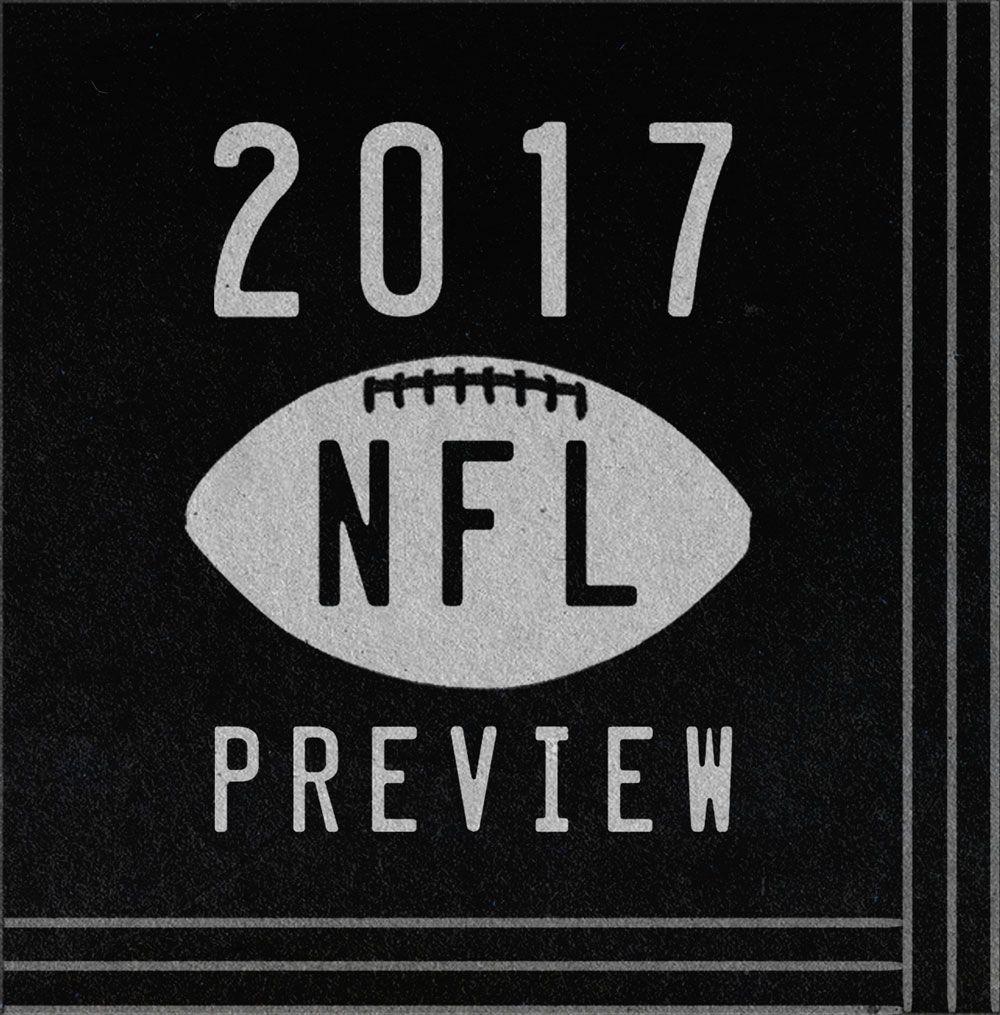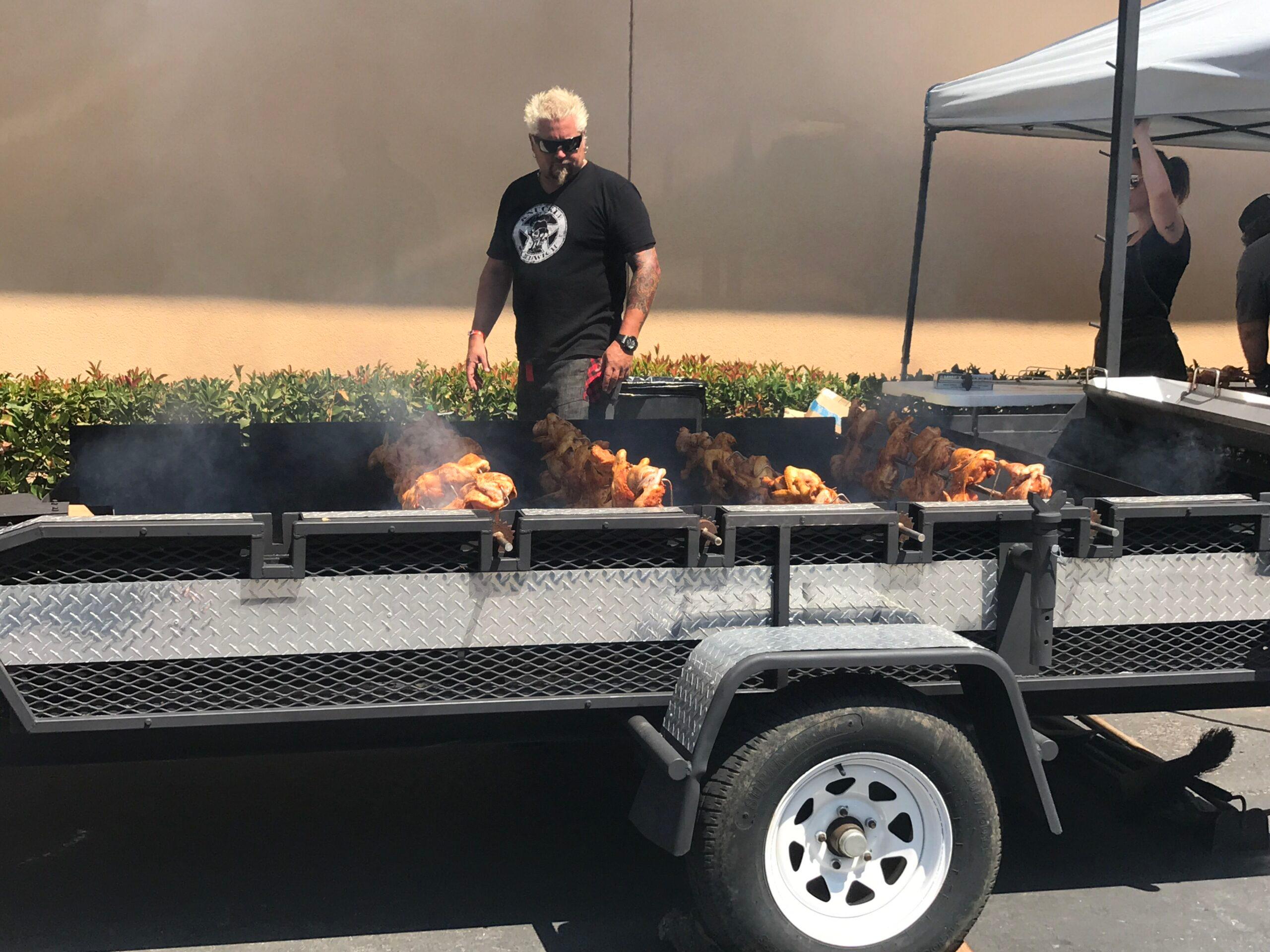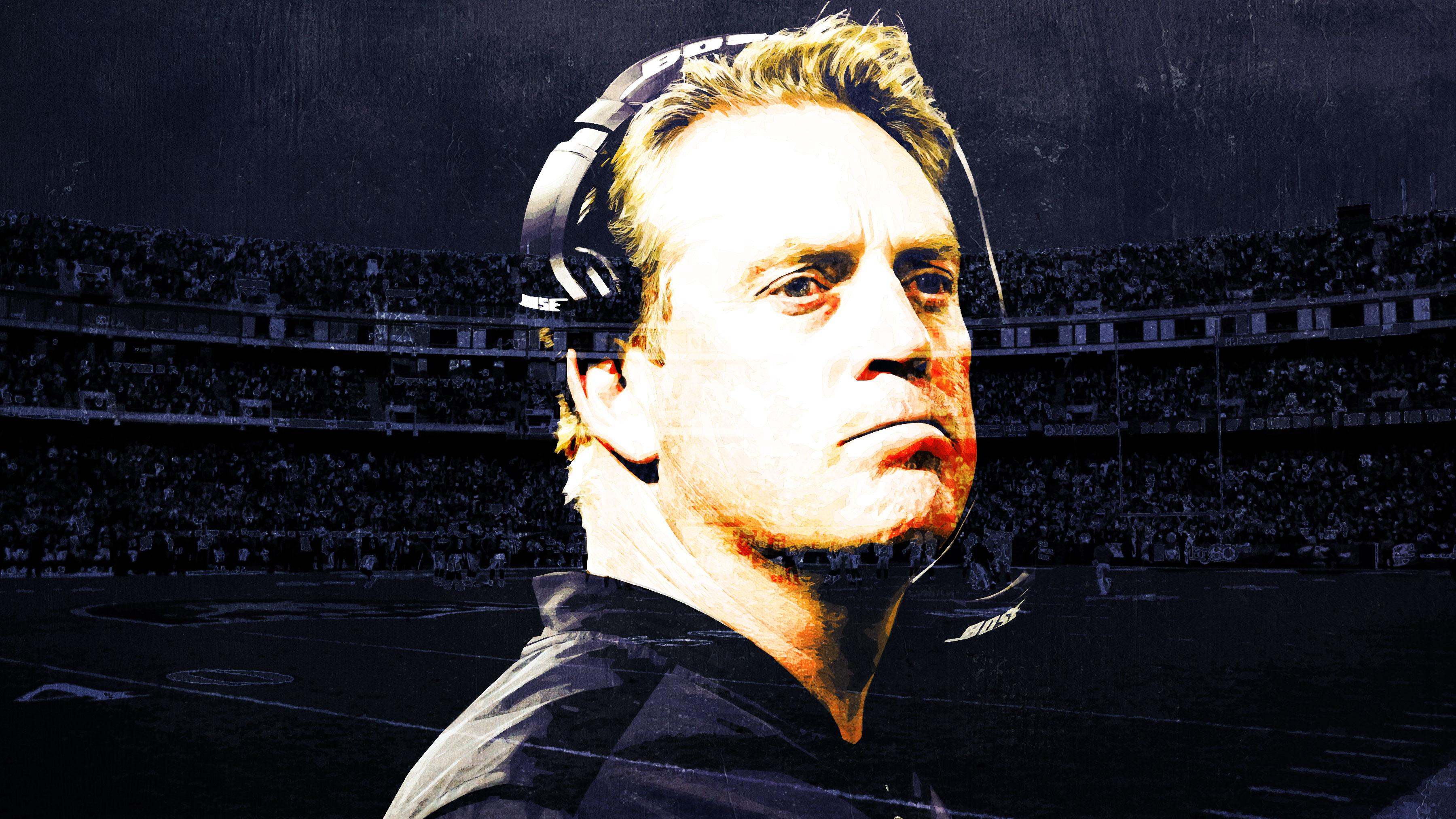Just Win, Baby: Jack Del Rio’s Quest to Bring a Championship Home to Oakland
The Raiders are title contenders. They’re also Las Vegas–bound. But before they depart, the East Bay boy now coaching the Silver and Black wants to give an incomparable parting gift to his childhood team: a Super Bowl.The 1970s were a rad time to be a sports fan in the East Bay. The mustachioed Oakland A’s won back-to-back-to-back World Series titles from 1972 to 1974 with Catfish Hunter and Rollie Fingers on the mound. The Golden State Warriors posted winning records for seven straight seasons and, with Rick Barry on the court and a 30-something Brent Musburger on the CBS call, swept the NBA Finals in 1975. Coach John Madden, quarterback Ken Stabler, and the rest of the 1976 Oakland Raiders capped off a 13–1 season with a 32–14 win over the Minnesota Vikings in Super Bowl XI, the first of three titles they’d capture in a span of eight years. And in the fall of 1977, a near-mythical creature with feathered blond hair and tree-trunk thighs named Jack Del Rio entered his freshman year at Hayward High.

Talk to enough folks who knew Del Rio, now the head coach of the Oakland Raiders, back when he roamed the hillsides and hallways of Hayward, and a sort of teenaged, Pacific coast, tri-varsity version of Paul Bunyan begins to emerge. “He was very identifiable as a physical specimen,” says Gary Clark, Del Rio’s football coach in those days. “Even at a young age, he was 6–2, had good speed, and was still growing.” Don Wakamatsu, a classmate and three-sport teammate of Del Rio’s since childhood who was no slouch himself — he went on to play pro baseball, manage the Seattle Mariners, and join the Kansas City Royals as bench coach — remembers Del Rio’s high school hoops career with awe: “He was a linebacker playing point guard,” Wakamatsu says. “He could dribble, he could shoot — he couldn’t really jump.” (Even heroes have flaws.)
According to former Hayward basketball coach Charley Kendall, Del Rio and Wakamatsu were part of a standout squad that averaged 93 points per game one season — and that was before the introduction of the 3-point line. And Del Rio’s dominance continued into spring sports. “One time in the playoffs,” says Jim Bisenius, then the Hayward baseball coach, “I gave him the ball, and he said, ‘What’s that for?’” Typically, Del Rio played catcher. “I said, ‘Pitch today,’ and he proceeded to strike out 16 batters.”
I didn’t take this job, second time around as head coach, and return to the area that I was raised in, just to come back and be average.Jack Del Rio
Del Rio was drafted in the 22nd round by the Toronto Blue Jays out of high school, recruited by Stanford for basketball (according to Kendall), and wound up enrolling at USC, where he played baseball and football. (The basketball coach was interested, too, Kendall says, but juggling three sports in college was too much for even Del Rio to pull off.) In his time on the Trojans baseball team, Del Rio drove in a run off Fernando Valenzuela during an exhibition game against the L.A. Dodgers; he was also hit by a fastball his USC teammate Randy Johnson threw, a pitch that shattered Del Rio’s cup and left him rolling around on the ground in torment. (Del Rio not only recovered to finish the game, but went on to father four children.) And in his final football game at USC, a 20–17 Rose Bowl victory over Ohio State, Del Rio helped shut down college football’s top rusher, the Buckeyes’ Keith Byars, and was named co-MVP for his trouble.
“He was a coach’s dream,” raves Clark. “He was All-Everything,” gushes Bisenius. “I was always ultra-competitive,” says Del Rio, speaking by phone in late August before an Oakland Raiders preseason practice, and delivering a self-assessment that could certainly earn him first-team All-Understatement honors. “I really loved playing whatever sport was in season.”
In 2015, after spending 11 years as an NFL linebacker, winning the Super Bowl as a position coach with the Baltimore Ravens, serving as head coach of the Jacksonville Jaguars for the better part of nine seasons, and working in various capacities on the staffs of three other NFL teams, Del Rio took over as head coach of the Raiders — a fitting homecoming for a local athletic legend who grew up just more than 10 miles south of the Coliseum. And in his first couple seasons with the Raiders, Del Rio has pushed his team to embody the old East Bay athletic greatness that he grew up enjoying firsthand.
He asks Oakland rookies to research old Raiders greats and present their findings to the rest of the team during training camp. Many of the tweets on his brash Twitter account are hashtagged #ReturnToGreatness. “I didn’t take this job, second time around as head coach, and return to the area that I was raised in,” says Del Rio, “just to come back and be average. The idea was to come back and bring that old [Raiders] slogan of ‘Commitment to Excellence’ — bring that back to life.”
Last season, Del Rio’s second in Oakland, he took a major step toward achieving that goal, coaching the Raiders to a playoff berth thanks to a 12–4 record that was their best showing since the 2000 season. Led by then-25-year-old quarterback Derek Carr, who has emerged as one of the NFL’s most promising young talents, and Carr’s good buddy Khalil Mack, a top pass rusher who has recorded 26 total sacks in his past two seasons and is the reigning Defensive Player of the Year, the 2016 Raiders took the league by high-scoring storm — at least until a broken fibula on Christmas Eve ended Carr’s campaign and torpedoed the team’s chance for postseason success.
Now, the Raiders enter the 2017 season facing a challenge more difficult than any they’ve confronted in years: not only matching last year’s success, but topping it — and this time without the benefit of surprise. The team has supplemented its ranks with walking Rorschach test Marshawn Lynch, fresh off a year-long sabbatical and already back to his unequaled old ways, and a new assistant head coach, John Pagano, whose mandate is to clean up the team’s oddly sloppy defensive unit. At the same time, though, the franchise will be playing a difficult schedule in a stacked AFC West with no clear weakest link. And no matter how much they try to downplay it, the Raiders will be shouldering the baggage of a looming relocation from Oakland to Las Vegas, a situation many messy years in the making and one that gives the next few seasons in Alameda County even greater urgency. Del Rio chooses to have selective vision as he looks ahead. “The bottom line is to embrace the legacy of the great players and teams that have come before us, and create our own,” says Del Rio. “But you can’t fit all those words in a hashtag.”
On the second-to-last day of Raiders training camp, up in the heart (and heat) of California wine country, a security guard chats with a fan about what things will be like in the Raiders’ new Las Vegas home: lots of opposing fans in the stands, probably, making a Sin City vacation out of each game. But all that is in the future, however not-so-distant it may be; a few yards away is where the here and now unfolds. Del Rio paces the sideline of one of the practice fields, looking like a mix between Shooter McGavin, Cap Rooney, and an ox.
At the far end of one field, Raiders punter Marquette King catches tennis balls shot from a machine and sets them down, again and again, as placeholding practice. Carr yells out “that’s my fault!” to wide receiver Amari Cooper after misfiring a pass. A loud argument erupts between linebacker Bruce Irvin and defensive end Mario Edwards Jr. and is coolly diffused by Mack; Irvin will later complain about the beat writers who tweeted about witnessing the skirmish. And on the other side of some hedges, smoke hangs in the air as Guy Fieri presides over a batch of rotisserie chickens for the players — 220 dripping birds will be prepared by the end of the day — spinning over a large bed of coals hitched to the back of a truck. Fieri also cooked at Raiders training camp last season, but this time the buzz is different. As Del Rio put it, he and the team are no longer aiming for average.

In early 2015, when Del Rio left his role as Denver Broncos defensive coordinator to take the Raiders’ top job, even average felt like an impossible dream for an Oakland team long defined by futility. When the late, irate Raiders owner Al Davis applied for a trademark on the words “Commitment to Excellence” on January 11, 2002, the Tuck Rule loss to the New England Patriots was eight days away and a blowout defeat to Jon Gruden’s Tampa Bay Buccaneers in Super Bowl XXXVII was a year ahead on the horizon. But those painful setbacks were nothing compared to the decade-plus of abject dysfunction that followed. “Commitment to Excellence” eventually seemed like a sick joke; the far more apt descriptor of the Oakland Raiders was another phrase trademarked by Davis, one meant to describe the rowdy section of seats behind the end zone filled with body-painted, skull-and-spike-wearing fans: “The Black Hole.”
Standing outside the Raiders’ training camp fields, with his own spiky white hair and his black T-shirt featuring a chef’s-hat-clad skull surrounded by the words “Knuckle Sandwich,” the name of Fieri’s corporate entity, the Food Network star looks like he could seamlessly slip into a seat in the Black Hole. “Yeah, you think that’s a coincidence?” says Fieri, who grew up in Northern California and has been a Raiders fan for a long, grim while.
From 2003 to 2014, the Raiders put up a 56–136 record, never finished any better than third in the AFC West, played in an increasingly decrepit stadium, and cycled through eight different head coaches. “The dumbest team in America in terms of playing the game,” is how one of those coaches, Bill Callahan, described the Raiders in 2003. “I’m pissed off at that football team,” ranted another, Hue Jackson, after a loss on New Year’s Day 2012. “This is a joke.” When Tony Sparano took over the team from Dennis Allen in 2014 after an 0–4 start, he tried out an old Bill Belichick gimmick, burying a football in an effort to cleanse the team from the demons of its past. But this funeral ceremony failed to spark the championship run that it had in New England; instead, the Raiders finished the season 3–13. (To be fair to Sparano, he wasn’t the only one who had tried a performative schtick in his first year with a franchise and failed: In Del Rio’s first season in Jacksonville, a motivational stunt involving a tree stump and an ax in the locker room ended the season of the team’s Pro Bowl punter.)
It may not have felt like it during the Allen-Sparano era, but by then the Raiders were actually beginning, however slowly, to veer back toward being on track. In 2012, former Raiders linebacker and Packers director of football operations Reggie McKenzie left Green Bay for the general manager job in Oakland, and set to work on a medium-term strategic rebuilding plan that involved ruthlessly clearing out old contracts to free up cap space, stockpiling draft picks, and assembling a solid offensive line. It wasn’t necessarily a smooth process; McKenzie’s initial head coach hire, Allen, compiled an 8–28 record before getting the boot for an interim Sparano, who didn’t fare much better. But at least for the first time in a while there appeared to be a method to the sadness surrounding the team.
In the 2014 draft, Oakland took Mack in the first round and Carr in the second. After that 3–13 season, the Raiders hired Del Rio and drafted Cooper fourth overall. In Del Rio’s first season, Mack increased his sack total from four to 15, Cooper caught six touchdowns, and Carr’s quarterback rating improved from 76.6 to 91.1. Now, as McKenzie poses for a photo with Fieri, two man-tanks grinning over rows of rotating meat, the Oakland Raiders are considered AFC contenders once more. Of course, this being the Raiders, there’s a catch: They won’t be playing in Oakland for very long. Following years of negotiations, demands, competing proposals, votes, protests, and temporary feints toward San Antonio and Los Angeles (and Sheldon Adelson’s wallet), the Raiders’ move to Las Vegas all became for-real-for-real earlier this spring.
Mercifully, however, when a report regarding the Raiders came out of Las Vegas during training camp, it had nothing to do with the status of the team’s planned Sin City arena. According to ESPN, the lure of 20–1 opening odds on an Oakland Super Bowl win had drawn a higher volume of bets on the Raiders than on any other NFL team, and not by a small margin. And while the frivolities of degenerate gamblers with cash to burn may not mean anything in the grand scheme of things, it was a reminder of just how many extra sets of eyes will be on the Raiders this season.
Practice ends, and Lynch, in a black Beast Mode hoodie and headphones propped up like mouse ears, ambles over to Fieri with a big smile on his face. “Man,” Lynch yells, “you out here burning shit up!” The two chat about a restaurant that Lynch, who grew up in Oakland, is taking over in nearby Emeryville; Fieri tells him he’ll come visit, and that they ought to at some point shoot an Oakland-based episode of “Triple-D,” Fieri-speak for his addictive TV show, Diners, Drive-Ins and Dives. Fieri shows Lynch the rotisserie setup, and concludes proudly: “That’s Flavortown all day!” The late Al Davis certainly would have appreciated Fieri’s way with trademarked slogans.
If last season was an unexpected coming-out party for Oakland, this year’s vibe will probably be more like that rager that all kinds of randos come out of the woodwork looking to crash. No one — not opposing teams, not longtime fans — will be taking the Raiders lightly this time around. And Del Rio knows that in football, the attention often falls primarily on two people: the quarterback and the head coach.
“We’ve got an outstanding relationship,” Del Rio says about Carr and himself. “It’s something I take a lot of pride in. I think it’s important to be on the same page, because we’re the two guys that have the won-loss record attached to our names; we’re the two guys that are going to be in front of the media all the time.” Carr is no stranger to the camera: Ever since he was a kinda-pudgy little football nerd of a kid who doted upon his older brother David, he was giving interviews on live TV. And while Carr has expressed very public relief that his rowdy early-college years didn’t get the exposure of his 2014 draft-mate Johnny Manziel, he’s also been more than willing to talk about them. (After Carr told Peter King in December that he’d like to help Manziel, the troubled QB said he’d take Carr up on the offer.) More recently, Carr donned fringed stonewashed denim and teased a music video that turned out to be some sort of viral advertising for a California credit union.
Carr is one of a number of players whose creativity Del Rio and his coaching staff seek to empower. While they stress that it’s important to play disciplined football, “you never want to over-coach a guy with great instincts,” Pagano, the newly hired assistant head coach, says during training camp. (In this case, he’s talking less about Carr’s hair-band wardrobe and more about safety Shalom Luani, a raw but intriguing seventh-round pick best known in his home country of American Samoa for his scoring touch on its national soccer team.) “It’s my first year here,” says linebacker IK Enemkpali, “and I can tell they’re real big on being playmakers, making the big plays. They really harp on that, even in meetings. They really don’t care about practice film, but they really care about games: ‘You gotta make the big plays.’” (No word on whether breaking Geno Smith’s jaw counted as such.) “Our coaching staff, obviously, they have to correct some things,” says Carr, “but they’re always going to let you know what you did well.”
Last season, Del Rio also showed that he was serious about being bold. In the final minute of the season opener on the road in New Orleans, after Carr had driven 75 yards for a touchdown score that put the Raiders down one point, Del Rio went not for the extra point to tie but rather for two and the lead. (“A rare kind of decision,” wrote The Ringer’s Danny Kelly, “one that defied both conventional and statistical wisdom.”) Carr found Michael Crabtree in the end zone, the Saints failed to convert a desperation 61-yard field goal in the game’s closing seconds, and the Raiders opened the season 1–0 and set the tone immediately for the kind of team they were striving to be. When ESPN’s Stats & Info division pointed out that going for two gave the Raiders less of a statistical chance to win than kicking the extra point would have, Del Rio fired back: “Good thing ESPN isn’t coaching the Raiders.”
“The games are so close in the National Football League,” says Del Rio, “and each Sunday you’re going to see the majority of the games come down to the last possession. … Whatever I believe is the best thing to do for us to win, that gives us the best probability to win, the best chance, then I have to have the courage to do that. And to me, it was really clear. I went down before the drive even started, and told Derek: ‘This is what we’re doing, we’re gonna take this ball, we’re gonna go down the field, we’re gonna score, and when we do, we’re gonna go for two and win the game right here, and right now.’”
But if the Saints game was a heady victory for the Raiders, the final score (35–34) also portended one of the significant issues that continues to plague the team: its porous and frequently disheveled defense. Mack’s defensive play was a noteworthy bright spot for the team last season, and entering 2017 Carr blew up his good buddy’s spot when he half-jokingly reupped a prediction that, if officials called holding as they should, Mack could record 30 sacks. (The current NFL record, held by Michael Strahan, is 22.5.) Still, given the backgrounds of Del Rio, McKenzie, and defensive coordinator Ken Norton Jr., all of whom played linebacker — Norton and Del Rio were teammates on the Dallas Cowboys back in the day — it’s particularly troubling that the defensive corps remains an area of such concern.
Last year, the Raiders gave up more than 24 points a game to opponents, and were one of seven NFL teams to allow more than 6,000 yards. They were 22nd in defensive DVOA. When it came to 25-plus-yard passing plays, Oakland yielded the most in the league. Were it not for a high-octane offense that averaged 26 points, the already-glaring defensive flaws could have doomed the Raiders. (According to Football Outsiders, the 12–4 Raiders had a point differential typically more indicative of a 9–7 team.) The Raiders did address some defensive issues in the draft, selecting five defensive players with their first six picks, but they were curiously quiet in free agency. Norton kept his job after his defense’s performance, but the Raiders fired defensive backs coach Marcus Robertson and added Pagano, the former defensive coordinator for the Chargers, in an oversight role where he will seek to improve the team’s communication. “We call it Raider Talk,” Pagano said during a training camp press conference. “Don’t go out of the realm and start talking some other language that nobody quite understands.”
Here’s some language that everyone can understand: homemade banana nut bread. It’s the evening of a preseason game between the Raiders and the Los Angeles Rams, and on the anti-scenic concrete walkway leading Raiders fans from the BART stop near Oakland Coliseum to the brutalist building itself, a man sells bottled water alongside his baked goods. It’s one of many similarly low-budget, unphotogenic, but made-with-love displays to be found all around the long-beleaguered venue. “They won’t have that in Vegas,” says a guy walking by in a Sebastian Janikowski jersey, with a bitter edge to his voice. (The actual Seabass has, incredibly, been the Raiders kicker for going on 17 seasons; he’s seen it all.)
Del Rio may be striving to connect today’s Raiders with their historical predecessors, but not all nods to the past are welcome ones. Just as Al Davis moved the team south to Los Angeles for 13 seasons before returning to Oakland, his son Mark, who inherited the Raiders when his father died in 2011, will preside over the Las Vegas move.
Still, when Mark Davis walks through the tunnel and onto the Coliseum field about an hour before game time, his Lloyd Christmas haircut hidden beneath a white hat that matches his white jeans, white Nikes, and white sports coat, Raiders fans nevertheless hang down over the railing hoping to get his autograph. When one of them offers up a Sharpie that isn’t silver or black, Davis seems genuinely dismayed. “Blue?!” he asks, but signs anyway.
Our coaching staff, obviously, they have to correct some things, but they’re always going to let you know what you did well.Derek Carr
For a preseason game in which the team’s top players aren’t expected to see too much playing time, the Raiders-Rams contest has some memorable moments. For the second week in a row, Lynch sits down during the national anthem. Asked after the first preseason game about Lynch’s gesture, Del Rio’s response was telling. Del Rio has never really hidden his own ideological perspectives; let’s just say that a few months back, he sent a tweet sticking up for Sean Hannity’s pursuit of the Seth Rich story. But he’s also smart enough to know not to antagonize his new player, or to rile up the media wolves with a particularly strong statement either way. Del Rio told reporters that he’d asked Lynch about the decision, and that Lynch had told him not to read too far into it — that it was something he’d done for years, and was “not a form of anything other than me being myself.” Del Rio told media that he told Lynch: “So you understand how I feel, I very strongly believe in standing for the national anthem, but I will respect you as a man. You do your thing.”
When I ask on the final day of training camp whether Del Rio really does give his players the freedom to be themselves, Lynch says, “Yeah,” then elaborates, kind of, by changing the subject to a Raiders offensive scheme: “Because on [the play] doctor-24,” Lynch says, “it’s a designed way that you’re supposed to run it, but I have all freedom to go any way that I choose to run it. I would say yes.”
At any rate, Lynch takes only a couple of carries against the Rams before being shut down for the night, but on one of those touches, he nearly breaks free for a long run, and the crowd’s delight is so pure that Carr later says he couldn’t hear and felt like he was playing on the road. “I didn’t want to quiet the crowd,” Carr tells reporters, “because they might get mad at me.” (On the other hand, if they didn’t get mad at him back when his “mentor,” Christian metal band lead singer Mattie Montgomery, called the Black Hole a hub of “lost souls” that Carr could redeem, perhaps they never will?) The defense is, once again, “poor,” as Del Rio later says in his postgame remarks, but Mack does manage to pick up a big sack on Rams quarterback Jared Goff. In his limited minutes, Carr hits Cooper, Crabtree, and tight ends Lee Smith and Jared Cook with crisp passes, and while he also throws an interception, he leaves the game in a great mood.
Asked in the locker room after the game about his own national anthem gesture — a hand on Mack’s back — Carr becomes unabashedly corny, his truest self. His answer includes the following words and phrases: “loving,” “love,” “we’re best friends and we love one another,” “I love our country more than anything,” “we’re free to show each other that we love one another,” “I love everybody,” and “all I’m trying to do is show these kids that I love everybody, and all Khalil is trying to do is show these kids that he loves everybody.”
When a reporter asks him about throwing a touchdown to Smith, Carr says: “I love him like a brother. We’ll be 50 years old someday, sitting down together, talking about that.” Presumably, Raiders fans hope that by the end of this season they’ll have accumulated some better, bigger memories than a preseason touchdown to one day reminisce about.
In a pair of Sports Illustrated interviews this spring, Del Rio explained why he doesn’t want to dwell on the Vegas move: For one thing, he told Peter King, a good 30 percent of a football team turns over year after year, and the move could be as many as three years away. And, as he explained to Jenny Vrentas, no one knows better than him the impact that the move will have on the people of Alameda County — which means that no one knows better than him how to best mitigate it: by winning, now. “These are my people,” he told Vrentas, relaying his message to the team. “These are my family and friends, and I’m telling you what I need. We are going to give our very best to where we are, and that’s where we are here and now.” In January, Del Rio honored some of “his people.” At a San Francisco event called the Coaching Corps Game Changer Awards, in which local sports figures are asked to single out a formative leader to give thanks to, Del Rio couldn’t choose, so he paid tribute to the entire gamut of his Hayward coaches. Bisenius, Del Rio’s old baseball coach, chuckles that, ever the multi-sport enthusiast, Del Rio most conspicuously geeked out over Golden State Warrior Draymond Green’s attendance at the ceremony.
Del Rio’s time in Hayward High may be the stuff of legend, but he’s not the only Del Rio whose reputation sounds borderline fictional. Tony Del Rio, his dad’s late cousin, who Jack called “Uncle,” was “one of the most badass high school football guys ever at Hayward,” says Kendall, the former basketball coach. “The Del Rio family was notorious in our area,” recalls Clark. Tony and his brother Wayne were huge guys who ran an auto body shop, painted and raced some remarkably sweet cars, and took on other employment on the side: Tony was, for a time, the personal bodyguard to the Oakland A’s Reggie Jackson, himself a car enthusiast, and according to an old local newspaper called The Argus, he also supplied occasional protection to Rocky Marciano and Evel Knievel. (“Del Rio carries no weapons and is not a student of the martial arts,” The Argus wrote, quoting Tony: “‘If I can’t handle them with my fists, I don’t want to handle them at all.’”)
“A lot of credit goes to [Jack’s] dad,” says Kendall. “In those days, most of the dads would come up and say, ‘Hey, if my kid screws up in practice, you kick his butt, and when he gets home, I’ll kick it.’” He laughs. “By the end of my career, it was more like, ‘Hey, don’t yell at my kid! He’s a D-I athlete!’ and it’s the 12th man on your team.”
Jack Del Rio Sr. was, and remains, an enormous Oakland Raiders fan, just like so many of the people Del Rio grew up knowing and loving. And while there’s a bittersweetness to the idea that the Raiders might finally make a comeback just as they’re about to go away, Del Rio knows that the best way to honor the team’s local legacy is to live out that “Commitment to Excellence” — to “just win, baby!” as Davis liked to say. “We just want to have that aggressive mentality, that aggressive mind-set,” says Del Rio, even if he knows his team has a whole lot of work ahead to have even an outside shot of such poignant success.
No matter what happens, Del Rio will always be beloved in Alameda County, spoken about in hushed, admiring tones. But if Del Rio and the Raiders can finish the party they started, if they can get anywhere close to a true #ReturnToGreatness, if they can leave the Bay Area on their own terms — well, it’ll make all those Bunyanesque high school tales look like mere child’s play.


